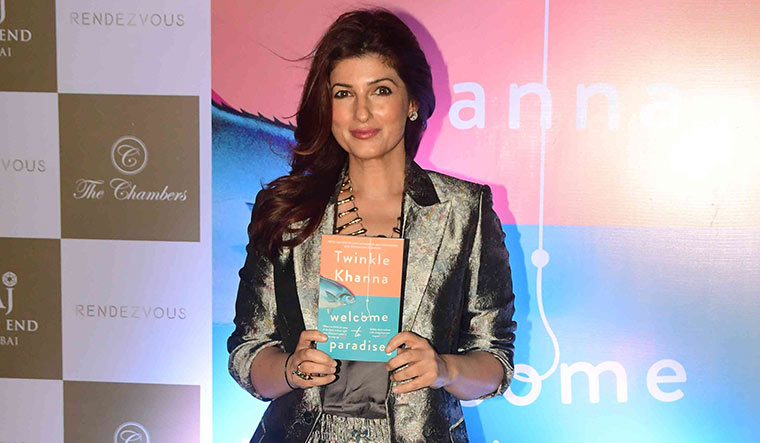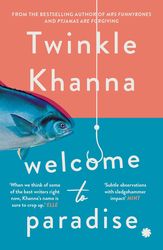It took Twinkle Khanna close to a decade to complete ‘Jelly Sweets’―the last short entry in her new five-story anthology, Welcome to Paradise. The other stories took close to four years to come to life. Every morning, starting 4:30am, she puts pen to paper at her work desk, which is next to a balcony that looks out over the Arabian Sea. For Khanna, writing feels like getting drowned in the light-soaked view for hours on end.
At 48, she is out with her fourth book. The creative process, she says, still remains almost totally opaque to her. “There have been times when I have written 10 chapters of a book and dropped it. I do that often. I have many unfinished stories languishing in my folders waiting for daylight to strike them,” she tells me. We are in her office, and she―dressed in a loosely buttoned shirt with bent collars and cotton trousers―is sipping black coffee.
Khanna could have easily produced her fourth book without labouring much. It could have been Mrs Funnybones Part 2, a sequel and a compilation of her columns, all of which were already there; in fact, her publishers advised her to do it, but she turned them down. “I didn’t want to take the easy route. I would rather stab myself in the heart, and that is what I did with this book,” she says.
The five stories in Welcome to Paradise can be read in a go. The degree in creative writing she recently earned has, in a way, influenced her manner, style and form of writing.
What is it that, in writing, both deeply interested her but had her struggling? “Non-linear narrative architecture, like in Alice Munro’s work,” she says. “Because I felt that I am very interested in how time works, especially in short stories, and I was personally struggling to do that effectively. The seamless way in which she moved her characters back and forth [in time] helped me in my own writing.”
One of the stories in the anthology, ‘Nearly Departed’, makes this evident. It is based on the real-life story of Narayan and Irawati Lavate’s widely reported pursuit of a pro-euthanasia law. In the story, an 86-year-old retired schoolteacher Madhura Desai writes to the chief justice of India seeking permission to die at a time of her choosing. As she bides away time, she finds love in Pipi, a friend who is of the same age and is equally lonesome. The story moves organically in time, leaping across ages and decades, and time zones and seasons, without losing grip. “In my mind, truth is like potato. You can make aloo jeera, you can make french fries. It’s how you present it,” she says.
‘Jelly Sweets’ is the most autobiographical of all five stories, says Khanna. That is why it took so long to finish, as it is based on stories that Khanna’s grandmother told her about her childhood in Satpati, Maharashtra. At the heart of this story is Nusrat, who despite having lost everything―including her husband, son and voice―finds love and light at the end of the tunnel.
It is clear that Khanna is mastering the requisite short-story skill set: observation, pacing, surprise and time. At the same time, though, she continues to be gleefully heedless of the rules that bind so many of contemporary writers. “I enjoy freedom and that is what this genre offers. I just want to be known as someone who tried to pursue authenticity and excellence. Thirty years from now, anyway, I would be put into a box and buried six feet under. Why should I limit myself now?” asks Khanna, who makes it a point to read science fiction every night.
Khanna’s prose is rugged and colloquial―just like the way she speaks. During our interview, her tone kept shifting back and forth from assertive lucidity to groggy self-deprecation. Some stories in Welcome to Paradise are short and snappy; others are long and languid. The ones that revolve around particular events in someone’s life are better than the ones which encompass an entire lifetime.
Khanna says she never wanted to be an actress, but the shadow is difficult to get rid of. Even now, she is not just an author, but a heroine-turned-author. “I told my mother that you wasted my 20 years, and then she was like, ‘See where you are today.’”
Khanna has never been short on stories she wanted to tell. She finds material in her own experiences, and her eventful life underlies most of her work. One wonders: did the recognition as an author come easy, piggybacking on her privileged status as a star? Even if that were true, Khanna has undeniably been a trailblazer in having audaciously ventured where too few Bollywood beauties have gone before―the business of writing.
Khanna is gregarious, outspoken and loves to laugh, but our interview also has moments of deep reflection. What do you want to be remembered as, I ask. She thinks long and hard, and says, “I am unable to process the world until I write my way through it. Next is to get inspired by [Haruki] Murakami’s process of writing―waking up at 5am and running 10km. Either he has a wife who hates him, or he doesn’t have a wife. I’m not sure.”
And she laughs out loud.
WELCOME TO PARADISE
By Twinkle Khanna
Published by Juggernaut
Pages 224; price Rs399



